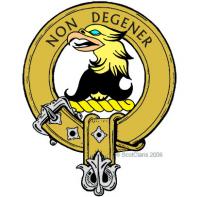
Clan Wedderburn
Clan Wedderburn People
Famous Wedderburns
James (c. 1495–1533), John (c. 1505–1556) and Robert Wedderburn (c. 1510–c. 1555)
Scottish religious reformers and poets. The Wedderburn brothers were all born in Dundee. All three brothers studied at St Andrews University.
James Wedderburn, who had gone to St Andrews in 1514, was for a time in France preparing for a mercantile career. On his return to Dundee in 1514 he received instruction in the Reformed faith from Friar Hewat, a Dominican monk. He composed a play called The Beheading of Johne the Baptist, and another called The Historie of Dyonisius the Tyrant, a morality satirizing church abuses, both of which were performed in 1540 in the play-field of Dundee. A charge of heresy was brought against him for counterfeiting the conjuring of a ghost, but he escaped to France, and established himself as a merchant at Rouen or Dieppe, where he lived unmolested until his death in 1553, although attempts were made by the Scottish community there to bring further charges against him.
John Wedderburn graduated M.A. at St Andrews in 1528. He took priests' orders and appears to have held the chaplaincy of St Matthews, Dundee, but in March 1539 he was accused of heresy, apparently for having, in conjunction with his brothers, written some anti-Catholic ballads. He escaped to Wittenberg, where with other of his compatriots he received the teaching of the German reformers. The death of James V. and the known leanings of the regent, the earl of Arran, to reform, encouraged many exiles, Wedderburn among them, to revisit Scotland. John Wedderburn was in Dundee as late as 1546, when he was obliged to flee to England. John Johnston in his Coronis martyrum says he died in exile in 1556.
Robert Wedderburn, who graduated M.A. in 1530 from St Leonard's College at the University of St Andrews, was ordained priest, and succeeded his uncle John Barry as vicar of Dundee; but before he came into actual possession he also was suspected of heresy, and was compelled to flee to France and Germany. He returned to Scotland in 1546. He appears to have been actual vicar of Dundee in 1552. His sons were legitimized in January 1553.
Joseph Henry Maclagen Wedderburn (1882 – 1948)
Scottish mathematician, who taught at Princeton University for most of his career. Joseph Wedderburn was the tenth of 14 children, he entered the University of Edinburgh. In 1903, worked as an assistant in the Physical Laboratory of the University, and obtained an M.A. degree with First Class Honours in mathematics.
He then studied briefly at the University of Leipzig and the University of Berlin. A Carnegie Scholarship allowed him to spend the 1904-1905 academic year at the University of Chicago where he worked with Oswald Veblen, E. H. Moore, and most important, Leonard Dickson, who was to become the most important American algebraist of his day.
Returning to Scotland in 1905, Wedderburn worked for four years at the University of Edinburgh as an assistant to George Chrystal, who supervised his D.Sc, awarded in 1908 for a thesis titled On Hypercomplex Numbers. From 1906 to 1908, Wedderburn edited the Proceedings of the Edinburgh Mathematical Society. In 1909, he returned to the United States to become a Preceptor in Mathematics at Princeton University; his colleagues included Luther P. Eisenhart, Oswald Veblen, Gilbert Ames Bliss, and George Birkhoff.
Upon the outbreak of the First World War, Wedderburn enlisted in the British Army as a private. He was the first person at Princeton to volunteer for that war, and had the longest war service of anyone on the staff. While a Captain in the Fourth Field Survey Battalion in France, he devised sound-ranging equipment to locate enemy artillery.
He returned to Princeton after the war, becoming Associate Professor in 1921 and editing the Annals of Mathematics until 1928. While at Princeton, he supervised only three Ph.Ds, one of them being Nathan Jacobson. In his later years, Wedderburn became an increasingly solitary figure and may even have suffered from depression. His isolation after his 1945 early retirement was such that his death from a heart attack was not noticed for several days.





